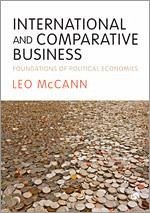
International and Comparative Business

PAYBACK Punkte
30 °P sammeln!
'Erudite and accessible, McCann demonstrates how the national gets reconfigured around the global without losing some of its unique features. Far from being a one-size-fits-all Anglo-American template, neoliberalism comes in many different hues and variations. This is by far the best textbook in the field and is destined to become a classic for years to come.' Manfred B. Steger, Professor of Political Science at the University of Hawai'i-Manoa, Honolulu, Hawai'i, USA 'A sweeping examination of systems of capitalism in theory and in the world's major industrial economies leads Leo McCann to cha...
'Erudite and accessible, McCann demonstrates how the national gets reconfigured around the global without losing some of its unique features. Far from being a one-size-fits-all Anglo-American template, neoliberalism comes in many different hues and variations. This is by far the best textbook in the field and is destined to become a classic for years to come.' Manfred B. Steger, Professor of Political Science at the University of Hawai'i-Manoa, Honolulu, Hawai'i, USA 'A sweeping examination of systems of capitalism in theory and in the world's major industrial economies leads Leo McCann to challenge the conventional wisdom on globalization. Historical analysis of the evolution of business systems and detailed examination of present practice demonstrate persuasively that, despite facing common challenges, distinctive national differences remain salient. A must read for anyone who needs to understand how business systems operate in an increasingly interdependent world economy.' - Dr Eileen Appelbaum, Senior Economist, Center for Economic and Policy Research, Washington, DC, USA Globalization has profound effects on national economies even as distinct national 'models' of capitalism remain. International and Comparative Business accessibly tracks the historical and socio-political contexts of the world's major countries on a chapter-by-chapter basis to the present day. The book provides a comprehensive, critical, yet concise introduction to each of the economies' key features, including macro overviews as well as organizational and workplace-level analysis. Each chapter features learning objectives, in-depth interpretation and critique of key literature, and annotated further reading to allow readers to rigorously navigate their way through the wealth of material available for each country. This text is essential reading for students and researchers in the areas of international business and cross-cultural management, comparative political economy, and history. Leo McCann is Senior Lecturer in International and Comparative Management at Manchester Business School, University of Manchester, UK














